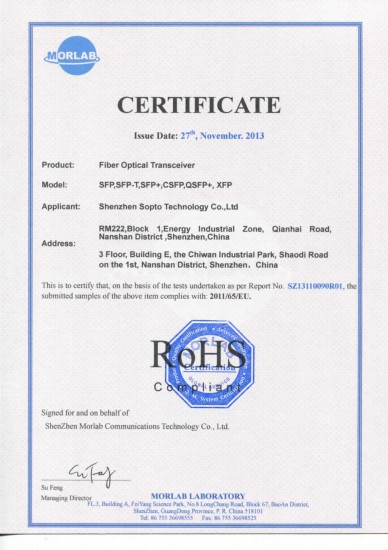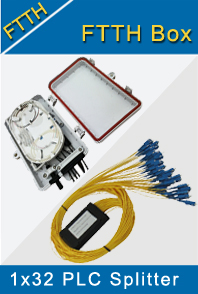-

- Sopto Home
-

- Special Topic
-

- FTTH Knowledge
-

- How does a PLC Splitter work?
FTTH Knowledge
- Solving the FTTH Rollout Problem in Multiple Dwelling Units
- WDM PON Introduction FAQ
- A Simple Overview of Optical Power Meter
- ODN is based on PON FTTH Optical Cable Network of the Device
- Using an OTDR to be an Expert in Fiber Link Testing
- How FTTH Broadband Works?
- Connections among Fiber Terminal Boxes & Patch Cables & Pigtails
- Easy to Install a Fiber Terminal Box
- What is Arrayed Waveguide Grating?
SOPTO Special Topic
Certificate



Guarantee
Except products belongs to Bargain Shop section, all products are warranted by SOPTO only to purchasers for resale or for use in business or original equipment manufacturer, against defects in workmanship or materials under normal use (consumables, normal tear and wear excluded) for one year after date of purchase from SOPTO, unless otherwise stated...
Return Policies
Defective products will be accepted for exchange, at our discretion, within 14 days from receipt. Buyer might be requested to return the defective products to SOPTO for verification or authorized service location, as SOPTO designated, shipping costs prepaid. .....
Applications

Sopto supply the best FTTH solutions for your network!
SOPTO Products
- Fiber Optic Transceiver Module
- High Speed Cable
- Fiber Optical Cable
- Fiber Optical Patch Cords
- Splitter CWDM DWDM
- PON Solution
- FTTH Box ODF Closure
- PCI-E Network Card
- Network Cables
- Fiber Optical Adapter
- Fiber Optical Attenuator
- Fiber Media Converter
- PDH Multiplexers
- Protocol Converter
- Digital Video Multiplexer
- Fiber Optical Tools
- Compatible
Related Products
Performance Feature
FTTH Knowledge
Recommended

How does a PLC Splitter work?
Passive Optical Network (PON) splitters play an important role in Fiber to the Home (FTTH) networks by allowing a single PON network interface to be shared among many subscribers. Splitters contain no electronics and use no power. They are the network elements that put the passive in Passive Optical Network and are available in a variety of split ratios, including 1:8, 1:16, and 1:32.
PLC Splitters are installed in each optical network between the PON Optical Line Terminal (OLT) and the Optical Network Terminals (ONTs) that the OLT serves. Networks implementing BPON, GPON, EPON, 10G EPON, and 10G GPON technologies all use these simple optical splitters. In place of an optical splitter, a WDM PON network will use an Arrayed WaveGuide (AWG).
A PON network may be designed with a single optical splitter, or it can have two or more splitters cascaded together. Since each optical connection adds attenuation, a single splitter is superior to multiple cascaded splitters. One net additional coupling (and source of attenuation) is introduced in connecting two splitters together.
A single splitter is shown in the GPON network diagram below. Note that the splitter can be deployed in the Central Office (CO) alongside the OLT, or it may be deployed in an Outside Plant (OSP) cabinet closer to the subscribers. A splitter can also be deployed in the basement of a building for a Multiple Dwelling Unit (MDU) installation.

Splitter in GPON Network
An interesting (and strange) fact is that attenuation of light through an optical splitter is symmetrical. It is identical in both directions. Whether a splitter is combining light in the upstream direction or dividing light in the downstream direction, it still introduces the same attenuation to an optical input signal (a little more than 3 dB for each 1:2 split).
There are two basic technologies for building passive optical network splitters: Fused Biconical Taper (FBT) and Planar Lightwave Circuit (PLC). Fused Biconical Taper is the older technology and generally introduces more loss than the newer PLC splitters, though both PLC splitter and FBT splitters are used in PON networks.
A Fused Biconical Taper 1:2 optical splitter is diagrammed below. A Fused Biconical Taper (FBT) splitter is made by wrapping two fiber cores together, putting tension on the optical fibers, and then heating the junction until the two fibers are tapered from the tension and fused together. FBT attenuation tends to be a bit higher than attenuation from PLC splitters.

Fused Biconical Taper Optical Splitter
A 1:8 Planar Lightwave Circuit (PLC) splitter is diagrammed in the figure below. A PLC splitter is made with techniques much like those to manufacture semiconductors, and these optical splitters are very compact, efficient, and reliable. A single 1:32 PLC splitter may be no larger than 1cm x 2 cm.

Planar Lightwave Circuit (PLC) Optical Splitter
The loss to be expected from a 1:8 splitter, like the one diagrammed above, is less than one dB greater than what would be expected from a perfect splitter, which has exactly 9 dB of loss (3dB for each 1:2 split). A good 1:32 PLC splitter has attenuation in both directions of less than 17 dB or even 16 dB (a perfect 1:32 splitter would introduce 15 dB of loss).
For more info, please browse our website.



